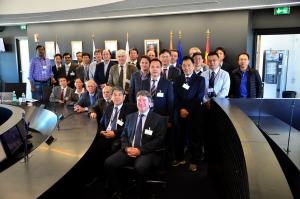The three-day meeting kicked off with a presentation by ITER Director-General Bernard Bigot on recent project progress and achievements and on the new organization set in place for the construction of the ITER machine and plant. ITER's planned research activities were also discussed—including an incremental "phased" approach and its impact on the TBM program.
In ITER, six technological solutions for a
tritium breeding blanket (in the form of test blanket modules plus ancillary systems) will be operated and tested for the first time.
The Program Committee noted that the test blanket systems are expected to be installed during the second pre-fusion power operation phase. The exact duration for this phase and possible impact on the TBM program will be analyzed in the coming months.
Activities for the test blanket systems are progressing well in the ITER Members. Conceptual designs have already been approved for two systems—the helium-cooled ceramic breeder (developed in
China), and the helium-cooled ceramic reflector (developed in Korea)—and for both of them the kick-off meeting for the preliminary design phase was held in early 2016. The conceptual designs of the remaining four test blanket systems are expected to be approved by the end of this year.
This will represent a major milestone in the TBM program since it will conclude the conceptual design phase for all the involved systems and components.
The connection pipes of the test blanket systems are captive components that have to be delivered well before First Plasma with due dates spread between 2020 and 2022. To respect need dates, significant progress has been made on their revised conceptual design and a contract with a Spanish consortium has been signed to perform the final design. An agreement covering the definition of responsibilities during the assembly, testing and commissioning of the connection pipes is planned.
Good progress has also been recorded in the R&D activities carried out by all seven ITER Members in support of the TBM program. The main milestones related to the activities planned for 2017-2019 were verified and confirmed during the meeting.
Work is also underway to develop a strategy to comply with the European regulations on nuclear pressure vessels (ESP/ESPN) in the test blanket module designs. Since all the test blanket modules use specifically developed reduced-activation ferritic/martensitic (RAFM) steels as structural material, this implementation could imply the need for an additional RAFM experimental program by the ITER Members. It is stressed that the development of RAFM steels is of strategic importance in the demonstration of fusion as an environmentally friendly energy source. The TBM Program Committee has requested each test blanket system owner to elaborate a strategy to be presented at future meetings.
Within the framework of the working group on test blanket system radwaste management, preparations continue for the signature of a trilateral agreement between the ITER Organization, the TBM Leaders and the Host country, which include discussions on the proposed strategies for dismantling after the operation of the test blanket systems. Another of the group's priorities is to provide TBM-related input to the safety analysis of the Hot Cell Facility.
Finally, the task force on TBM program safety reported that significant progress has been achieved in the harmonization of inputs in view of reporting to the French safety authority (ASN) in 2017.
Background information
A tritium breeding blanket ensuring tritium breeding self-sufficiency is a compulsory element for a demonstration power reactor (DEMO), the next-step after ITER. Therefore although a breeding blanket is not required for ITER, since it will procure the tritium from external sources, among the ITER missions it is included that "ITER should test tritium breeding module concepts that would lead in a future reactor to tritium self-sufficiency, the extraction of high grade heat and electricity production."


